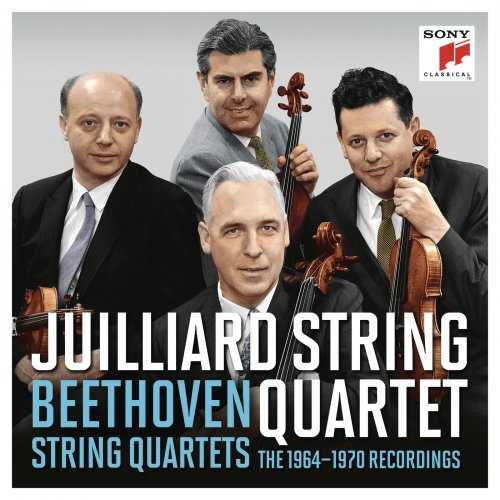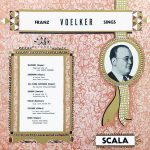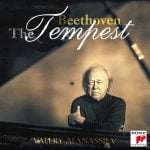
Composer: Ludwig van Beethoven
Performer: Juilliard String Quartet
Orchestra:
Conductor:
Audio CD
Number of Discs: 1
Format: FLAC (tracks)
Label: Sony
Release: 2020
Size: 9.67 GB
Recovery: +3%
Scan: cover
String Quartet No. 1. In F major, Op. 18/1
01. I. Allegro con brio
02. II. Adagio affettuoso ed appassionato
03. III. Scherzo. Allegro molto
04. IV. Allegro
String Quartet No. 2. In G major, Op. 18/2
05. I. Allegro
06. II. Adagio cantabile
07. III. Scherzo. Allegro
08. IV. Allegro molto quasi presto
String Quartet No. 3. In D major, Op. 18/3
09. I. Allegro
10. II. Andante con moto
11. III. Allegro
12. IV. Presto
String Quartet No. 4. In C minor, Op. 18/4
13. I. Allegro ma non tanto
14. II. Scherzo. Andante scherzoso quasi allegretto
15. III. Menuetto. Allegretto
16. IV. Allegro
String Quartet No. 5. In A major, Op. 18/5
17. I. Allegro
18. II. Menuetto
19. III. Andante cantabile
20. IV. Allegro
String Quartet No. 6. In B-Flat Major, Op. 18/6
21. I. Allegro con brio
22. II. Adagio ma non troppo
23. III. Scherzo. Allegro
24. IV. La malinconia. Adagio – Allegretto quasi allegro
String Quartet No. 7. In F Major, Op. 59/1 “Rasumovsky”
25. I. Allegro
26. II. Allegretto vivace e semore scherzando
27. III. Adagio molto e mesto
28. IV. Allegro
String Quartet No. 8. In E Minor, Op. 59/2 “Rasumovsky”
29. I. Allegro
30. II. Molto adagio
31. III. Allegretto
32. IV. Finale. Presto
String Quartet No. 9. In C Major, Op. 59/3 “Rasumovsky”
33. I.. Introduzione: Andante con moto – Allegro vivace
34. II. Andante con moto quasi Allegretto
35. III. Menuetto. Grazioso
36. IV. Allegro molto
String Quartet No. 10. In E-Flat Major, Op. 74 “Harp”
37. I. Poco adagio – Allegro
38. II. Adagio ma non troppo
39. III. Presto
40. IV. Allegretto con variazioni
String Quartet No. 11. In F Minor, Op. 95 “Serioso”
41. I. Allegro con brio
42. II. Allegretto, ma non troppo
43. III. Allegro assai vivace, ma serioso
44. IV. Larghetto espressivo – Allegretto agitato
String Quartet No. 12. In E-Flat Major, Op. 127
45. I. Maestoso – Allegro
46. II. Adagio, ma non troppo e molto cantabile
47. III. Scherzando vivace
48. IV. Finale
String Quartet No. 13. In B-Flat Major, Op. 130
49. I. Adagio, ma non troppo – Allegro
50. II. Presto – L’istesso tempo
String Quartet No. 13. In B-Flat Major, Op. 130
51. III. Andante con moto, ma non troppo
52. IV. Alla danza tedesca. Allegro assai
53. V. Cavatina. Adagio molto espressivo
54. VI. Finale. Allegro (Remastered)
55. Great Fuge. In B-Flat Major for String Quartet, Op. 133 (Remastered)
String Quartet No. 14. In C-Sharp Minor, Op. 131
56. I. Adagio, ma non troppo e molto espressivo
57. II. Allegro molto vivace
58. III. Allegro moderato
59. IV. Andante, a non troppo e molto cantabile; Più mosso; Andante moderato e lusinghiero – Adagio; Allegretto; Adagio, ma non troppo e simplice; Allegretto
60. V. Presto
61. VI. Adagio quasi un poco andante
62. VII. Allegro
String Quartet No. 15. In A minor, Op. 132
63. I. Assai sostenuto. Allegro
64. II. Allegro ma non tanto
65. III. Molto adagio
66. IV. Alla marcia, assai vivace
67. V. Allegro appassionato
String Quartet No. 16. In F major, Op. 135
68. I. Allegretto
69. II. Vivace
70. III. Lento assai, cantante e tranquillo
71. IV. Grave ma non torppo tratto. Allegro
juilliard-string-quartet-beethoven-quartets-1964-1970-remastered249602.rar – 937.0 MB
juilliard-string-quartet-beethoven-quartets-1964-1970-remastered249603.rar – 1.1 GB
juilliard-string-quartet-beethoven-quartets-1964-1970-remastered249604.rar – 813.1 MB
juilliard-string-quartet-beethoven-quartets-1964-1970-remastered249605.rar – 1.3 GB
juilliard-string-quartet-beethoven-quartets-1964-1970-remastered249606.rar – 1.0 GB
juilliard-string-quartet-beethoven-quartets-1964-1970-remastered249607.rar – 1.5 GB
juilliard-string-quartet-beethoven-quartets-1964-1970-remastered249608.rar – 1.1 GB
juilliard-string-quartet-beethoven-quartets-1964-1970-remastered249609.rar – 1.4 GB
SEE, HEAR & LEARN MORE! Notes & Editorial Reviews Works on This Recording Customer Reviews
Notes and Editorial Reviews
In celebration of Beethoven’s 250th anniversary year, Sony Classical is pleased to release the internationally renowned Juilliard String Quartet’s recordings of Beethoven’s String Quartets recorded from 1964-1970.This stunning mid-price box set will be the first ever release of the Juilliard String Quartet’s 1964-1970 Beethoven cycle, in a single 9-CD edition. 6 LPs featured in the box set appear for the first time on CD, remastered from the original analogue masters using 24 bit / 192 kHz technology. The booklet includes a with new essay by string expert Tully Potter and full discographical notes.
The Juilliard String Quartet, which was founded in 1946 is one of the world’s most prestigious string quartets in the world. In February 2011, the quartet received the NARAS Lifetime Achievement Award for its outstanding contributions to recorded classical music.
It was in 1964 – a few years after an early foray into Beethoven with four of the works for RCA Victor’s Red Seal label – that the Juilliard String Quartet embarked on this complete set. They started out with the three “Razumovsky” and “Harp” quartets, which Columbia released the next year on its subsidiary Epic label. The six “Early Quartets”, op. 18, followed in 1968 – 69; the “Late Quartets” in 1969 – 70, along with op. 95 to complete the set of “Middle Quartets”. By now all the Juilliard recordings were appearing on Columbia Masterworks, including their Beethoven in three separate volumes. In celebration of the 250th anniversary of Beethoven’s birth, Sony Classical is pleased to present the Juilliard’s complete cycle for the first time on CD in a single box, newly remastered on nine discs.
In a 1970 survey of available recordings of the “Middle Quartets”, High Fidelity, the leading US record journal, pinpointed the ensemble’s special qualities: “The Juilliard plays with a sense of precision and rhythmic thrust unmatched by any other quartet currently active I find their playing highly expressive, but this expressivity is the result of clear articulation of formal structure rather than mere surface nuance.” The same magazine, reviewing the “Late Quartets” in 1974, called the Juilliard’s “a fine achievement. This group has managed to maintain over the years (and over recent personnel changes) the vibrancy and precision that has always been its characteristic, and it has more recently added a dimension of depth and interpretive subtlety that places it at the very top of the field The incisiveness and force of its playing is generally acknowledged, but what also emerges here is the wonderful fluidity of its performances One of the principal difficulties in performing the late Beethoven quartets is the problem of integrating the different tempos and characters of juxtaposed, contrasting sections into a larger unit, so that the music doesn’t become overly fragmented. The Juilliard does this exceptionally well and thereby provides a well-focused view of the larger continuity. Individual lines are also carefully differentiated, and the intonation is impeccable.”
The leading UK record journal, Gramophone, was similarly generous in its praise of the Juilliard Quartet’s Beethoven. Reviewing the “Early Quartets” in 1976, it wrote: “This is surely one of the great ensembles of our time. The sweet beauty of their tone is emphasized by the superb quality of the recording Furthermore the balance is unusually good. For once both viola and cello have as much immediacy as the first violin and the stereo placing is unusually clear. The players have superb control over their bows in quick movements some of which are taken incredibly fast! The way the first movement of the B flat goes off like a rocket is irresistible. This is real opera buffa stuff To a greater extent than any other modern ensemble I can think of the Juilliard Quartet draw attention to structural points and changes of key with touches of rubato.”And writing in 1979 about a limited LP release of their complete Beethoven cycle, Gramophone observed: “There is impeccable intonation, everywhere, and a standard of ensemble playing which is second to none and shows why the Juilliard enjoys a reputation as one of the world’s most renowned quartets.” Now this famous set is more accessible than ever to move and inspire new generations of music lovers.
Writing about the outstanding American pianists who came to international attention during the post-war years, my late colleague Harris Goldsmith cited interpretive characteristics such as clarity over sensuality, a preference for “crew-cut” brilliance of definition, a certain high-powered (some call it “driven”) intensity, and a hard-grained approach to sonority. These words easily apply to the Juilliard Quartet’s 1964-’70 Beethoven cycle. To collectors weaned on 1950s Beethoven standard-bearers like the Budapest, Hungarian, and Végh quartets, the Juilliard’s impact was akin to being tossed into a cold shower.
Contrary to Sony BMG’s claim, this release does not mark the 1964-’70 cycle’s first integral CD edition; Sony actually brought out a limited import box in 2002, which I have not heard. But the label’s new transfers from original tape sources consistently reveal a more robust, less monochromatic string sonority in relation to the flintier treble-oriented LPs in my collection.
For example, the slow-moving chords and shimmering trills in Op. 59 No. 3’s introduction sound slightly drab and wan on my dog-eared vinyl pressing, yet gain a subtle yet haunting degree of tonal nuance on CD. The same holds true for the opening pages of Op. 132’s extraordinary Heiliger Dankgesang movement, where the ensemble’s rapt, long-lined concentration surpasses its faster, less inward earlier RCA recording. Heightened timbral allure also uncovers a sustained tension that I did not initially appreciate in the Juilliard’s broad reading of Op. 18 No. 2’s Adagio, which contrasts to the faster and relatively facile (though equally well played ) RCA Guarneri Quartet recording.
Because the acoustics of Columbia’s legendary high-ceilinged 30th Street Studio are more apparent than before, rapid cascading passages such as those in Op. 18 No. 1’s Finale and in the Op. 127 Scherzo now emerge as playful rather than wiry. Indeed, the late quartets abound with memorable details. Here the ensemble captures the quirky whimsy of Op. 135’s opening Allegretto with a genial and conversational demeanor that differs from their slightly mechanical earlier RCA version and the faster, more aloof live remake from the Library of Congress. Similarly, the tempo relationships and tricky points of balance in Op. 131’s long theme and variations movement appear more internalized and assiduous in the present recording in comparison with the earlier and later Juilliard traversals. While unrelenting abrasiveness is appropriate for the Grosse Fugue, I favor more breathing space and tender respite in the slower passages (i.e., the Takacs Quartet).
Perhaps Beethoven’s combative temperament and the Juilliard Quartet’s acerbic, tensile profile fuse best in the middle quartets, and these clean yet impassioned interpretations easily explain their erstwhile reference status. That said, the Juilliard’s less superficially perfect digital remakes of Op. 59 No. 3 and Op. 95 arguably dig deeper. I prefer the former’s heftier, more inflected slow movement, pronounced subito dynamics, and observance of both repeats in the first movement. And while ferocity has its place in the Op. 95 Allegro con brio, the slightly slower live traversal’s wider scope of dynamics and articulations brings forth a newfound sense of yearning and desolation below the music’s petulant surface.
Needless to say, there are many ways to approach the Beethoven quartets, and I would not want to be without my reference Alban Berg, Smetana, Végh, and Takacs cycles. Nor, for that matter, that of the Juilliard Quartet, whose 1964-’70 recordings infuse these amazing works with freshness, vitality, and meaning. Special mention should be made of Tully Potter’s insightful annotations.



